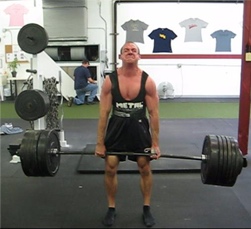Dynamic vs. Repetition
Written on July 17, 2008 at 9:45 am, by Eric Cressey
Q: I’ve heard about people using a “repetition day – upper body” instead of the “dynamic effort day – upper body.” What are the differences? How come you use the dynamic effort day instead of a repetition day in your Ultimate Off-Season Training Manual? Is a repetition day more CNS-intensive?
A: Who says you can’t do both?
Throw a medicine ball, and then do rep work on the bench. Or, do jump squats before you deadlift. Oh no! Heresy!
Most inexperienced athletes need both. Dynamic work usually encompasses drills that help teach deceleration/landing, change-of-direction, and acceleration while improving reactive ability. Repetition work helps strengthen connective tissue and groove appropriate movement patterns. You can do both!
I’d generally say that the dynamic stuff is more CNS intensive, particularly when it involves a lot of jumping/sprinting (due to ground reaction forces, or GRF). For instance, with sprinting, ground reaction forces can anywhere from 4-6 times an athlete’s body weight; the better the technique, the lower the stress from the GRF.
Conversely, if you’re a 1,000 pound squatter who is doing “speed” work with six plates a side, it’s still going to be considerably easier than jumping in and doing four sets of six reps at 750 pounds or so.
The point is that there really isn’t a right answer. It’s influenced by your training age, overall strength, the stimuli to which your body has already been exposed – and the areas in which you need to improve the most.
The Ultimate Off-Season Training Manual

Category Blog | Tags: Building The Efficient Athlete, Eric Cressey, Magnificent Mobility, Off-Season, Rotator Cuff Exercises, Rotator Cuff Rehab, Shoulder Exercises, Shoulder Health, Shoulder Impingement, Shoulder Pain, Shoulder Rehab, Strength Training, Unstable Surface Training, Weight Lifting Program, Weight Lifting Routine, Weight Training, Workout Program, Workout Routine
|












July 17th, 2008 at 5:02 pm
How are there LESS ground reaction forces with improved technique? Improved technique allows you to apply more force and have greater ground reaction forces and therefore, run faster.
July 18th, 2008 at 6:05 am
Doesn’t improved technique helps you absorb and therefore transfer force quicker.
July 18th, 2008 at 8:00 am
Evan,
Give this a read:
http://ecressey.wpengine.com/newsletter77.html
Improve your technique, and you don’t overstride; that’s when ground reaction forces can rough you up.
July 18th, 2008 at 1:07 pm
Eric, I understand what overstriding does and I understand what ground reaction forces are–You have taken the articles and studies out of context because overstriding does not cause greater ground reaction forces. Surely, you’ve understood the studies that have clearly shown that increased speeds come with increased ground reaction forces. With improved technique, comes improved force application and greater ground reaction forces.
That isn’t to say you should overstride or anything like that, but that does not make you increase GRF and improved technique certainly doesn’t lessen it, but does just the opposite. I think you may be confusing what biomechanists mean by GRF with an idea of mechanical stress placed on certain tissues when running inefficiently.
July 18th, 2008 at 3:53 pm
I’d generally say that the dynamic stuff is more CNS intensive, particularly when it involves a lot of jumping/sprinting (due to ground reaction forces, or GRF). For instance, with sprinting, ground reaction forces can anywhere from 4-6 times an athlete’s body weight, depending on technique (the better it is, the lower the GRF).
I think Evan and Ian mean that the ground reaction forces are higher and Eric is trying to say the landing stress is better with improvement on technique. Less force with poor foot strike is worse than high force and great foot strike technique.
Carl Valle
July 18th, 2008 at 6:12 pm
… and in turn more force with poor technique would be a recipe for injury.
I was just trying to highlight the point that GRF can be savage if technique is poor, improving technique would I guess increase force production and this if improved in-line with technique improves speed of movement and the transfer of efficent movement… though I guess that was the point of eric’s post.
July 18th, 2008 at 7:12 pm
Then he should have said that because his current statements are wholly wrong and counter to the research (quite abundant) on GRF at the moment.
July 18th, 2008 at 7:30 pm
Modified gentlemen; definitely poorly worded on my part. Thanks for the posts.